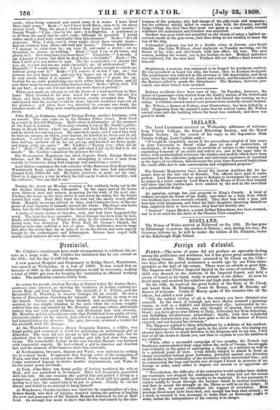. . Vrtnnuun 1.
Mr. Cobden's constituents have made arrangements to celebrate his re- turn on a large scale. Mr. Cobden has intimated that he can attend on the 27th; but the day is still left open.
A new general Hospital and Dispensary in Bridge Street, Manchester, was opened on Wednesday, at a cost of 1000/. It was stated that an increase of 500/. in the annual subscriptions would be necessary, making a total of 1000/. per year for keeping the institution in efficient working order. The institution contains thirty beds.
An action for assault, tried on Tuesday at Oxford before Mr. Justice Byles, possesses some interest, as showing the virulence of feeling existing be- tween High and Low Churchmen. The plaintiff, J. C. Pettitt, sued the Reverend C. T. Heartley, to recover damages for an assault. He was a factor of Birmingham travelling for himself. At Tenbury he went to see the church. Service was just being finished, and, according to his own account, he was simply standing in the nave when the sexton roughly ordered him out, and assisted by Mr. Heartley and some others, afterwards turned him out with great violence, and ill-treated him very. severely. Mr. Heartley and his subordinates state that Pettitt had been guilty of very irreverent conduct in the church, had celled it a synagogue of Satan, and had himself taken the offensive. The jury, however, returned a verdict for the plaintiff, with 12/. damages.
At the Winchester Assizes, Henry Benjamin Haynes, a soldier, was found guilty and sentenced to death for murdering an unfortunate girl at Aldershot. The man did not intend to kill this particular girl, but he admitted thst he intended to kill another girl who had done him some wrong. The remarkable feature in the case was that Haynes was tortured with remorseful regrets. He had seduced a girl iu America and deserted her, and the memory of his baseness made him miserable.
At Northampton, two men, Ingram and Watts, were indicted for setting fire to a straw stack. It appeared that Ingram acted at the instigation of Watts, and that when a reward was offered, Watts turned informer. The Judge sentenced Ingram to twelve months' imprisonment, and Watts to twelve years' penal servitude.
At York, John Riley was found guilty of having murdered his wife at Hull, and was sentenced to be hanged. Riley had frequently quarrelled with his wife. On one occasion she quitted him and gained a living as a sempstress, and unfortunate. Riley tracked her, lived with her again, and having beat her, she caused him to be put in prison. Finally he cut her throat, and failed in an attempt to hang himself.
At Winchester, Charles Gardner was tried for the manslaughter of a boy, Robert Smith, who died of injuries received during the process of landing the crew and passengers of the Eastern Monarch destroyed by fire at Spit- head. An attempt was made to show that the fire was caused by the care-
lessness of the prisoner, who had oharge of the giro-room and magazine ; but the evidence wliolly failed to connect him with the disaster, and the Judge telling the Jury that they must not guess at a man's guilt, counsel withdrew the indictment and Gardner was acquitted. Gardner was next tried and acquitted on the charge of using a lighted un- covered candle in the gun-room, and thus doing an act tending to cause the loss of the ship.
Unfounded jealousy has led to a double crime at Jarrow, near South Shields. One John Wilthew, about daybreak on Tuesday morning, cut the throat of his wife, and afterwards, with less effect, his own. The poor woman, holding the wound, ran to her brother-in-law. Medical assistance was rendered, but she soon died. Wilthew did not inflict a fatal wound on himself.
Stephenson, a seaman, was sentenced to be flogged for mutinous conduct. He was punished on board his ship, the Ccesar, then in Keyham dockyard. The punishment was inflicted in the presence of 200 shipwrights, and these men, when the culprit cried out, hissed and yelled, and threatened to attack the Marines called to quash the disturbance. The Marines, however, pre- vailed, and three rioters were arrested.
Railway accidents have been rare of late. On Tuesday, however, the driver of a passenger-train started from the Dudley station of the Oxford and . Wolverhampton line before a goods train had cleared the crossing on to a siding. A collision ensued and several persons were severely cut and bruised.
Mr. Wilcox, a farmer at Godney, near Glastonbury, has been killed by a bull. Supposing from the animal's noise that he wanted water, Mr. Wilcox carried some into the building where the beast was confined, and there was gored to death.


























 Previous page
Previous page